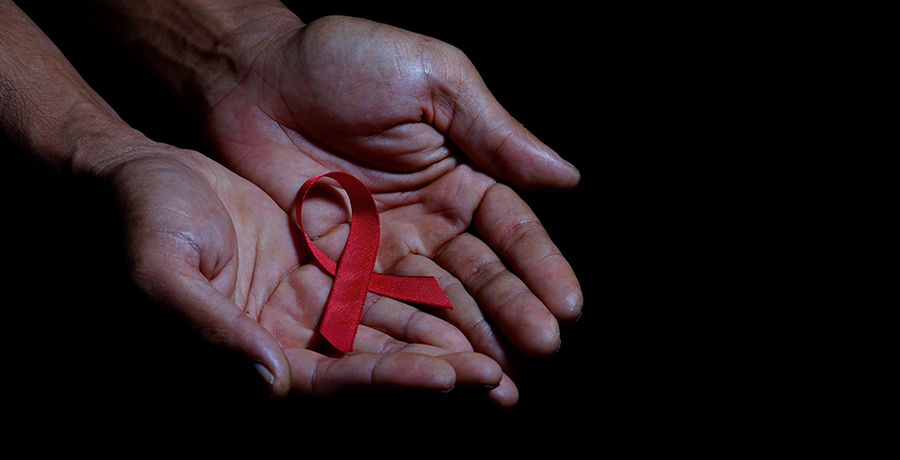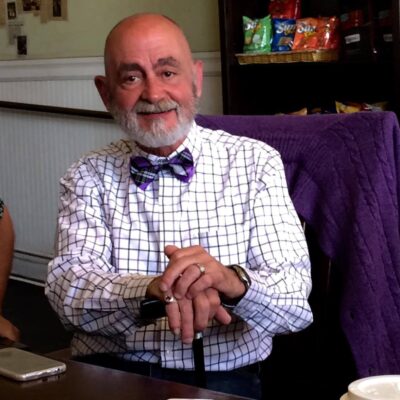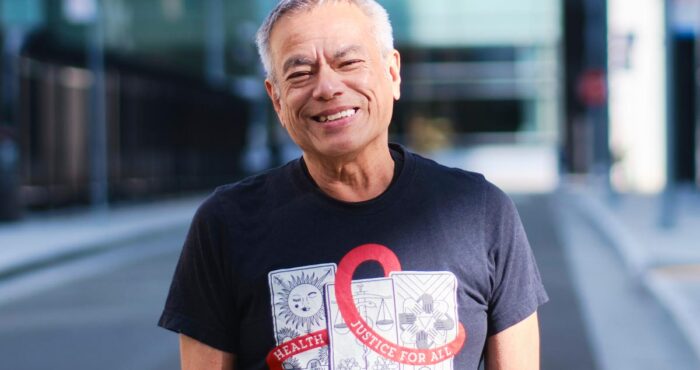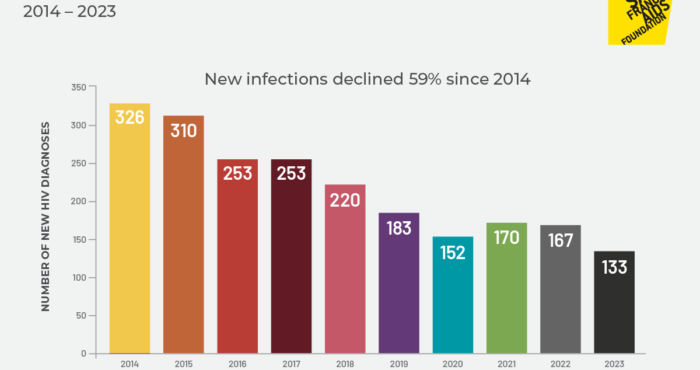World AIDS Day 2023: A Long-Term Survivor Reflects on the Past and Present

In 1987, James W. Bunn and Thomas Netter, public information officers for the Global Programme on AIDS at the World Health Organization in Geneva, Switzerland, conceived of an international day dedicated to raising awareness about HIV and the AIDS pandemic. They presented their idea to Dr. Jonathan Mann, Director of the Global Programme at the United Nations (now UNAIDS), who liked and approved their recommendation. Since 1988, every Member Nation of the U.N. has recognized December 1 as World AIDS Day.
I’m not one to assign mystical significance to numerological coincidences, but… World AIDS Day was first commemorated in 1988, just one year before my own diagnosis with HIV. And WAD is now 36 years old — just as I was 36 in 1989 when I was diagnosed. And at the time of my diagnosis, I had lost 36 of my friends to AIDS.
That’s when I stopped counting. The deaths haven’t stopped, just my counting them. The grief we all experienced during and since the first fifteen years of the pandemic has been amplified by the other struggles we long-term survivors of HIV/AIDS encounter every day.
To understand what we lost in the 80s and 90s, we need to start with just a brief glance at what was happening in San Francisco and other American cities during the 1970s. For that, I’d like to quote my friend Harry Breaux, one of the five activists who co-wrote The San Francisco Principles 2020, who moved here in 1970. “At that time,” Harry says, “the skies opened up and it started truly ‘raining men.’ Lesbians and gay men attained previously unheard-of sexual and social freedoms, and the world looked hopeful for gays of all types to attain some degree of protection from harassment. We made courageous lifestyle choices that brought the homosexual genie out of the closet unlike anything that had ever happened before. Those brave men and women are basically the ones who died in the early 80s after the [HIV] incubation period ran out for so many.”
All of my adult life I had wanted to live in San Francisco to experience the freedom and the sense of liberation that this city has always stood for. I finally moved here in August 1980. In less than a year, I saw that sense of freedom and liberation turn into abject terror. During those first fifteen years from 1981 to 1996, my generation, the AIDS Generation, was literally decimated. Unless you lived through those years, it’s impossible to understand just how quickly and how brutally our friends got sick, suffered immeasurable pain, withered, and died. Friends that we were intimate with, friends whom we ran into regularly at the bars, friends that we went dancing with on weekends or invited into our homes for winter holiday meals — no one was spared. In those days, before the advent of any successful treatment, an HIV diagnosis was tantamount to a death sentence. I’ve written elsewhere that our doctors handed us the HIV diagnosis with one hand and a death certificate with the other, just waiting for the appropriate date to be filled in. If you were a gay man in San Francisco in the 1980s and early 1990s, you were terrified of contracting HIV.
But grief, fear, and death were not the only horrors we faced in those days. If we gay men were afraid of contracting HIV, the rest of the world was terrified of US. We were ignored by public health officials; we were laughed at by politicians; and we were condemned to hell by religious leaders who told us that AIDS was their god’s punishment for being queer. In Congress there was actually a proposal that all HIV+ people be TATTOOED and quarantined in concentration camps. Insurance companies cancelled the policies of HIV-positive clients and denied new coverage to anyone with HIV as a pre-existing condition. Many doctors and dentists simply refused to treat us; funeral homes refused to bury us. To say that people who were HIV-positive were treated as lepers would be a generous assessment.
Because we were treated as lepers, many of us lost our jobs to fear of the virus. Many of us were kicked out of our rental homes due to fear of the virus — I know at least four men here who lost their jobs, were illegally evicted from their apartments, and ended up living on the streets. Because they were HIV-positive. Even worse, many of us were abandoned by our families — I’ve heard horror stories about men with HIV who went home to see their families one last time, but were denied entrance into the family home, left to die alone. Other family members wouldn’t let us around their young children. And so innumerable young men died without even the comfort of home.
So the first fifteen years of the AIDS pandemic were pure hell for us, and not only because of the ravages of the disease. Things improved somewhat in 1996, when the first “cocktail” of highly active antiretroviral treatment became available and saved the lives of millions of people. But saving our lives led to other problems, what my friend the activist Matt Sharp has called “the unintended consequences of surviving.”
HIV is no longer an automatic death sentence — at least, not in this country. Many of us have lived with the virus in our blood for decades now. There are currently 1.7 million people living with the virus in the United States — and 55% of us are over the age of fifty; the CDC estimates that by 2030, that percentage will be 70%. Here in San Francisco, long-term survivors already make up some 75% of people living with HIV. All of this means that there is an entire population of HIV-positive people that has only recently been recognized as a unique cohort of patients with unique needs. The reason for this late recognition is fairly clear: Even with the most effective antiretroviral treatments, no one expected us to live this long. The very notion of “aging with HIV” was impossible to imagine when AIDS was considered a death sentence. And thus, we are now living lives that we never expected to have.
Another reason that there has been so little research into the effects of living for decades with HIV is a little more insidious. After the cocktail was introduced in 1996, the medical community pretty much turned their backs on us. Their attitude seemed to be, “Hey! We gave you the medicine, we saved your lives, now go sit in the corner and take your drugs like a good little guinea pig and leave us alone!” It is only recently, and due to the demands of us long-term survivors, that we have received any substantial attention.
From the research that has been done, we know the following —
- People over fifty who are living with HIV are subject to the same health concerns as the general population when it comes to the effects of aging. However, HIV-positive people experience those effects at an accelerated rate, sometimes twelve to fifteen years earlier than HIV-negative people. As I’ve written elsewhere, “Sixty-five is the new 80.”
- Our immune systems especially age prematurely, making us more susceptible than our HIV-negative counterparts to cardiovascular disease, heart attacks, osteoporosis, bone loss and frailty, Hepatitis C and other diseases of the liver, balance issues that lead to crippling falls, kidney malfunction, premature hearing loss, blindness due to CMV infection, diabetes, cancer and leukemia, and the one that scares me to death, dementia.
- Today, most long-term HIV survivors live below the national poverty level and need financial help for rent, food, and the cost of medications, doctor visits, and therapy. Many times when we were diagnosed in the 80s or 90s, our doctors assured us that the best thing we could do for our health was to stop working and live on Social Security Disability Insurance for the one or two years we had left to live. And so, many of us did exactly that, on doctors’ order — we quit work, went on SSDI, sold our stocks, emptied our savings accounts, maxed out our credit cards, and decided to live as best we could for the limited time left us. And then a funny thing happened — we didn’t all die! So now here we are in what was supposed to be our Golden Years, living on very small, fixed incomes in a time when the cost of everything skyrockets every day.
- The psychological impact of aging with HIV is immeasurable. Imagine spending the entire decade of your twenties or thirties… burying your friends, burying your lovers, your cousins and uncles, or even your dad. NO ONE should ever have to deal with that much death and chaos and terror even once, let alone constantly day-after-day over a fifteen-year period. We long-term survivors have lived with death as a constant in our lives for three or four decades. The psychological trauma of that lingers forever — it even has a name, AIDS Survivor Syndrome.
- Perhaps the most damaging psychological effect of aging with HIV is the isolation and loneliness it brings. When you’ve lost your entire social circle, when you’ve buried all your friends, the grief can lead to self-isolation and a disconnect from the community. That kind of loneliness and isolation often lead to alcohol and substance use, as well as cognitive decline. In some large cities like San Francisco and New York, there are AIDS service organizations like San Francisco AIDS Foundation and Shanti that work to alleviate that isolation in the HIV community, providing social events and other ways to connect with other survivors. But those ASOs can reach only so far — what about those long-term HIV survivors living in rural parts of Arkansas or Iowa or West Virginia who cannot access the help offered by those ASOs?
The challenges faced by us long-term HIV survivors are virtually hidden to all but those of us who suffer from them. World AIDS Day was conceived to honor our friends, lovers, and family who succumbed to this hideous disease. The rituals we perform on that day — such as reading the names from the Names Project AIDS Quilt and writing the names of our dead on the sidewalks on Castro Street for “Inscribe” — are important means of ensuring that we keep those whom we’ve lost in our hearts and minds. I sincerely urge that we also recognize the trauma suffered by those of us who survived AIDS and continue to live with HIV more than forty years after the beginning of the Plague Years. Spill a drop for those who are gone, shed a tear for those who remain.










